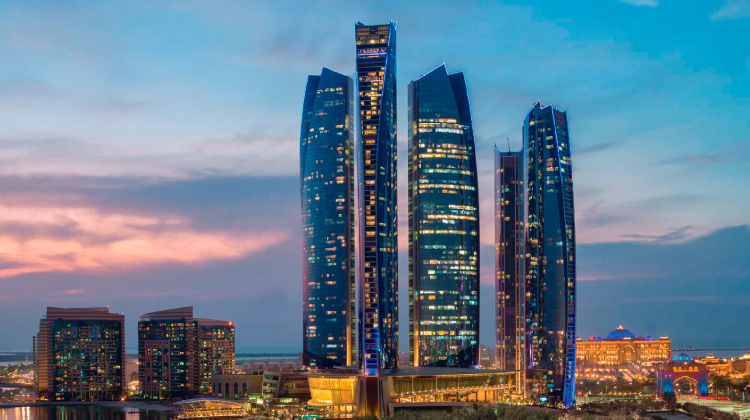ICT, Advanced Technology and Space

Abu Dhabi has a vibrant digital economy and is a leader in Information and Communications Technology (ICT) innovation. Over the last few decades, the city has developed the necessary infrastructure to adopt next-generation technologies such as artificial intelligence (AI), the internet of things (IoT), alongside the launch of the UAE Strategy for the Fourth Industrial Revolution (https://u.ae/en/about-the-uae/strategies-initiatives-and-awards/federal-governments-strategies-and-plans/the-uae-strategy-for-the-fourth-industrial-revolution) strengthening its position as a global hub for disruptive technologies and innovation.
Market growth
Innovation is a national priority for the UAE. The country invests USD 3 billion in innovation each year. IT spending is projected to increase by 6.5 percent over 2020-2023 to reach a total of USD 8.2 billion and AI will contribute USD 96 billion to the UAE’s economy by 2030
The country as a whole is adopting big data and cloud-based solutions which is further expected to propel the market over the next few years. Globally, the public cloud service market is expected to reach USD 623.3 billion by 2023. (https://webtribunal.net/blog/cloud-adoption-statistics/#gref)
Developments in Abu Dhabi’s advanced technology and AI capabilities have unlocked opportunities for all other innovation-focused sectors such as education, renewable energy, healthcare, space, transportation, and aviation. The UAE’s SmartPass system has created a digital framework for the operations of all government services and ministries, and the UAE Strategy for Artificial Intelligence (AI) 2031 https://ai.gov.ae/wp-content/uploads/2021/07/UAE-National-Strategy-for-Artificial-Intelligence-2031.pdf plans for AI technology to be incorporated into these services.
Abu Dhabi has invested heavily in developing first-class IT infrastructure, innovative technologies, and a skilled workforce. Initiatives include:
- AED 735 million was provided by the Abu Dhabi Investment Office (ADIO) to ICT companies in 2021
- Creation of the Open Data platform by the Abu Dhabi Digital Authority (https://addata.gov.ae/) for quick and safe access to reliable data
- Abu Dhabi is home to the world’s first AI university; the Mohamed bin Zayed University of Artificial Intelligence. (https://mbzuai.ac.ae/)
- Establishment of the Advanced Technology Research Council (ATRC), the overarching advanced technology research body in Abu Dhabi and the UAE (https://www.atrc.ae/)
- In 2021, Abu Dhabi unboxed the Middle East’s first quantum supercomputer at the Technology Innovation Institute (https://www.thenationalnews.com/business/future/2021/08/17/abu-dhabi-unboxes-quantum-supercomputer-and-its-a-marvel/)
- AED 25 billion will be invested by the UAE in the digital industry over the next 10 years
- 100,000 UAE Golden Visas will be issued to the best coders from around the world
- Launch of Amazon Web Services (AWS) cloud infrastructure in the first half of 2022 (https://www.reuters.com/world/middle-east/uae-get-3-amazon-web-services-data-centres-2022-2021-05-26/)
- The UAE is to host the PyCon Summit (the largest programming summit in the Middle East) in late 2022 (https://wam.ae/en/details/1395302966902)
- The Fourth Industrial Revolution Network is expected to add AED 25 billion to the national economy by 2031
The Fourth Industrial Revolution Strategy
The UAE’s Fourth Industrial Revolution Strategy (https://3r0eov1j2vmb3ino8b1g5v28-wpengine.netdna-ssl.com/wp-content/uploads/2019/09/En-UAE-4-IR-Strategy.pdf) aims to increase innovation and productivity, reduce the industrial sector’s carbon footprint, and add AED 25 billion to the economy by 2031. (https://gulfbusiness.com/the-digital-revolution-in-the-middle-east/) Industry 4.0 is a cornerstone of the government’s roadmap to ensure the country supports innovation and opens new economic possibilities for generations to come. The strategy will leverage Fourth Industrial Revolution technologies such as automation, advanced manufacturing, blockchain, artificial intelligence (AI) and internet of things (IoT).
A Booming IT & Telecommunication Industry
Abu Dhabi was the first capital city in the world to achieve 100 percent fibre-to-home broadband connectivity (https://www.arabianbusiness.com/industries/technology/abu-dhabi-first-in-world-get-full-fibre-optic-coverage-396335#:~:text=Etisalat%20on%20Tuesday%20said%20that,services%20more%20than%20230%2C000%20subscribers) The emirate offers an advanced technology and telecommunications infrastructure boasting one of the highest smartphone and internet penetration rates in the world. Moreover, 99.15 percent of the UAE’s population use the internet and is among the top 10 globally in spending time online and using social media. (https://www.globalmediainsight.com/blog/uae-internet-statistics/)
Abu Dhabi is one of the world's most connected cities and ranks among the top 3 fastest 5G capitals worldwide. (https://www.gccbusinessnews.com/abu-dhabi-placed-among-top-3-fastest-5g-capitals-worldwide/)
The UAE is ranked as the most digitally advanced in the Arab world thanks to its digital progress and preparedness for the future, according to a survey issued by the Portulans Institute in collaboration with Google (https://www.thenationalnews.com/business/technology/2021/09/21/uae-tops-arab-world-in-future-readiness/) The UAE ranked third among 27 emerging global economies, according to the Future Readiness Index Survey. (https://www.portulansinstitutefrei.com/pdfs/Future%20Readiness%20FREI%20Report%20Portulans%20Institute%20Sept%202021.pdf)
Digital Abu Dhabi
Abu Dhabi was already an early adopter of cutting-edge digital technologies before the COVID-19 pandemic began. The city is highly ranked in the IMD Digital Competitiveness Index (https://www.imd.org/centers/world-competitiveness-center/rankings/world-digital-competitiveness/) The index measures the capacity and readiness of 63 national economies to adopt and explore digital technologies for economic and social transformation. The ranking measures knowledge, technology and future-readiness. Abu Dhabi ranked 11th overall in the Global Technology Index, based on the World Digital Competitiveness Yearbook 2020.
The pandemic served to accelerate Abu Dhabi’s digital strategy even further, strengthening the city’s competitiveness. By embedding ICT in government processes and digitalising services to improve efficiency, Abu Dhabi has become a regional leader in e-commerce, digital government, and smart public service delivery.
Tech Start-ups
Abu Dhabi actively promotes small and medium-sized enterprises (SMEs) and start-ups with attractive stimulus measures. The city boasts a thriving community of start-up incubators and accelerators such as the tech accelerator startAD (https://startad.ae/), which nurtures seed-stage start-ups and helps connect them with corporate partners, and Hub71 (Where-To-Set-Up-Your-Business) a tech ecosystem that has attracted more than 102 start-ups in the realms of FinTech, health tech, and AI. Hub71 businesses have a combined worth of AED 5.87 billion, and almost 1,000 jobs have been generated since its establishment in 2019. (https://www.thenationalnews.com/business/start-ups/2022/03/23/abu-dhabis-hub71-start-ups-bag-408m-in-funding-since-2019/)
In addition, the capital is home to Ghadan 21 (Where-To-Set-Up-Your-Business) the government-led AED 50 billion accelerator programme and the twofour54 media zone (Where-To-Set-Up-Your-Business), which is transforming Abu Dhabi into a global gaming centre.
Artificial Intelligence (AI)
The UAE sets a clear vision through its AI Strategy, to become the world leader in AI by 2031(https://ai.gov.ae/wp-content/uploads/2021/07/UAE-National-Strategy-for-Artificial-Intelligence-2031.pdf) AI has the potential to generate up to AED 335 billion for the UAE economy (https://ai.gov.ae/strategy/#:~:text=The%20country%20will%20focus%20on,key%20to%20the%20UAE's%20success) To achieve this, the UAE offers access to world-leading universities and is a hub for highly skilled professionals to re-skill in the most in-demand AI roles. The country has appointed its first Minister of Artificial Intelligence, and begun integrating AI with industries such as education, healthcare, space, transportation, and aviation.
Space
Over the past decade, the UAE has experienced unprecedented innovation in the space sector. In 2014, it launched the UAE Space Agency (UAESA) (https://u.ae/en/about-the-uae/science-and-technology/key-sectors-in-science-and-technology/space-science-and-technology) headquartered in Abu Dhabi and in 2015, Khalifa University opened its new Spacecraft Platform for Astronautic and Celestial Emulation (SPACE) laboratory. The UAE achieved a historic milestone in September 2019, when Hazza Al Mansouri became the first astronaut from the UAE to venture into space.
Over the next 10 years, the country plans to invest more than AED 3 billion (USD 816 million) in the private space sector to grow the country’s capabilities in space. (https://www.thenationalnews.com/uae/uae-in-space/2022/04/04/how-the-uae-plans-to-become-a-big-space-power-in-the-region/) This year, the UAE announced a collaboration with Masdar City in Abu Dhabi to establish the first space economic zone.




